4 homemade natural cleaning products that work brilliantly
Look through your cupboard and you'll probably find it full of cleaning products with very specific purposes. The manufacture, use and disposal of many of these conventional cleaners are ultimately toxic to the environment. But you don’t always need to leave your house or jump online when you run out of cleaner. Other, more natural ingredients you may already have in your kitchen can be an effective solution against stains and bacteria. You can even, sometimes, use old fruit.
The next time one of your cleaning products runs out, consider mixing together one of these natural homemade alternatives instead.

ALL-PURPOSE CLEANER
Lemon is naturally antibacterial and antiseptic, and the acetic acid in white vinegar breaks down dirt and germs. Castile soap is a vegetable-based soap that has disinfectant properties - but it can be substituted for another all-natural, fragrance-free bar soap if needed.
Tea tree essential oil is a natural disinfectant, but it can be swapped out for eucalyptus, thyme or lavender if you have these essential oils in the house instead.
Ingredients:
- Leftover peel of 2 lemons
- 1/2 cup white vinegar
- 1 tbsp castile soap
- 1 cup of water
- 8 drops tea tree essential oil
Directions:
- Combine the lemon peels and white vinegar into a container, cover it and let them infuse together for a week.
- Remove the pieces of lemon peel. Add the castile soap, water and tea tree oil to the vinegar.
- Shake the ingredients together.
- Pour into a spare spray bottle to use it more easily.
- Spray and wipe with a wet towel or sponge afterwards.
Useful for:
This all-purpose cleaner mixture is great for spritzing on floors, countertops, bathroom fixtures or whatever surface your heart desires (almost).
Never use vinegar, lemon, or other acidic substances on marble or granite surfaces, as it will damage them. It's recommended also not to use vinegar on aluminium, waxed wood or cast iron, for the same reason.
GLASS CLEANER
The vinegar in this cleaner will rid glass of dirt, but be careful not to use more than is in the recipe, as too much will eventually cloud your glass.
Rubbing alcohol will lift residue and leave your mirrors streak-free. And as cornstarch granules are very fine, they'll tackle marks and smears on your windows at a macro level.
Ingredients:
- 1/4 cup white or apple cider vinegar
- 1/4 cup rubbing alcohol at 70% concentration
- 1 tbsp cornstarch
- 4 cups of water
Directions:
- Combine the ingredients in a spray bottle and shake it up to mix them.
- Spray onto glass surfaces. Avoid cleaning windows on a hot day as the solution may dry too quickly and leave streaks.
- Wipe the glass with a dry microfibre cloth or soft rag until it shines.
Useful for:
This DIY homemade cleaner is appropriate for any glass surface you want to clean - including mirrors, windows and electric stovetops.
LAUNDRY DETERGENT
Castile soap, or a similar bar soap alternative, will effectively lift dirt from clothing stains. Soda crystals, or Sodium Carbonate Decahydrate, will remove limescale and build-up from your washing machine at the same time as cleaning your clothes.
Ingredients:
- 1 bar of castile soap
- 1/2 cup soda crystals
Directions:
- Shave the bar of soap with a cheese grater or similar tool.
- Mix together the soap shavings and soda crystals, and store in a container.
- Spoon 1 tbsp into your washing machine drawer per load, or 2 for larger loads and heavy soiling.
Useful for:
This homemade laundry detergent should be effective on any clothing and washing machines. As its ingredients are so mild, there should be no concerns it'll discolour or take its toll on any beloved garments.
FURNITURE POLISH
The citric acid in lemon juice is invaluable in lifting stains from surfaces. Meanwhile, olive oil is notorious for conditioning and polishing wood.
Only make as much of this homemade cleaning product as you'll use within a month, as it will go off quite quickly.
Ingredients:
- 1/4 cup of juice from leftover lemons
- 1/2 cup olive oil
Directions:
- Mix the two ingredients together.
- Dip the corner of a dry, soft cloth into the furniture polish, and rub the mixture along the grain of the wood.
- Repeat until you've covered your piece of furniture.
- Using another cloth, wipe along the surface of the wood to pick up any oily residue.
Useful for:
Kitchen cupboards, bedroom dressers, wardrobes, dining tables... Any wooden furniture in your home that you want to bring vibrant colour back into.
This furniture polish can be mopped across hardwood flooring, but sparingly, as any shiny, slippery residue left behind will create a safety hazard.
READY TO MAKE SOME NATURAL CLEANING PRODUCTS?
Not every natural ingredient is best for every kind of cleaning, and it's important to prioritise hygiene. Before delving into the world of homemade cleaning products, this guide from Treehugger gives more information on how effective the most common cleaning substances are.

